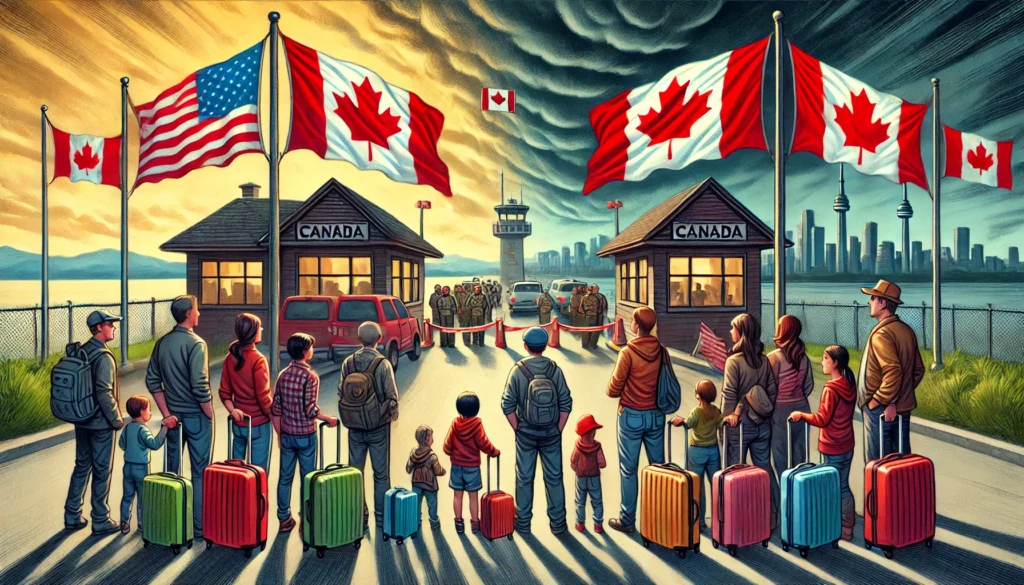Subheading: Rising Numbers Seek Canadian Citizenship Amid Political and Economic Turmoil
Following Donald Trump’s presidential election win, a growing wave of Americans are exploring pathways to Canadian citizenship. Concerns over potential price hikes at gas stations and grocery stores, driven by Trump’s sweeping global tariffs, have heightened the urgency for many to consider relocating north.
Spike in Immigration Inquiries
Immigration lawyers on both sides of the U.S.-Canada border report a significant surge in inquiries from Americans looking to move. Evan Green, managing partner at Green and Spiegel law firm in Toronto, told Spectrum News that his firm has seen a threefold increase in calls since Trump’s victory.

“We are currently in a period of heightened uncertainty,” Green explained. “People are aware of what’s on the horizon, and that knowledge is motivating them to act quickly.”
Zach Ahlstrom, a senior attorney at Berardi Immigration Law in Buffalo, New York, shared similar observations. “Under the Biden administration, we received one or two calls a month. Since the new administration took office, that number has risen to one or two a week.”
Who Is Choosing to Relocate?
Green identifies four main groups seeking to move, with three feeling particularly vulnerable under Trump’s leadership. The first group includes individuals with direct family ties to Canada, such as parents or grandparents who are Canadian citizens, simplifying their path to citizenship.
High-net-worth individuals, especially families with historical ties to World War II, are also devising exit strategies. Additionally, public figures critical of Trump and LGBTQ+ families, particularly those with transgender members, are urgently exploring relocation options.
Social Media Drives Relocation Discussions
Dissatisfaction with Trump’s administration is increasingly visible on social media. Facebook groups dedicated to Americans considering a move to Canada have seen rapid growth. Sam Keane from Washington State joined one such group with over 31,000 members right before Trump imposed new tariffs on Canada, Mexico, and Chinese imports.
“With the political environment deteriorating rapidly, it’s becoming harder to envision a future in the U.S.,” Keane posted. She plans to move to Kelowna, British Columbia, after securing a work visa.
Similarly, Jamie Swenson shared that she and her husband are actively exploring options to leave the U.S. for safety reasons. ShaNae Scott announced that her family had “officially decided to move to Canada” just a day before the new tariffs took effect.
Concerns About Canada’s Political Future
While many are eager to move, some are wary of Canada’s political trajectory. An anonymous poster expressed concerns that Canada might shift to the right, especially with Prime Minister Justin Trudeau’s upcoming resignation and the Conservative Party, led by Pierre Poilievre, leading in the polls.
“With a potential new Conservative Prime Minister, how will Canada change?” the poster asked. “We don’t want to uproot our family only to face similar issues elsewhere.”
Navigating Canadian Immigration
Relocating to Canada presents challenges, especially for those without family ties. Green notes that obtaining a student visa remains one of the easiest pathways, though opportunities are becoming limited. In 2024, Canada issued 35% fewer study permits than the previous year.
Another route is securing a Canadian work permit, which generally requires a job offer. Applicants must provide biometrics and may need medical exams, adding up to three months to the process. As of January 29, the average processing time for an American work visa application from outside Canada is about four months.
Steps to Canadian Citizenship
Achieving Canadian citizenship involves additional steps. Applicants must first become permanent residents, living in Canada for at least three of the past five years. They must also pass a citizenship test, file taxes, and prove proficiency in English or French, the country’s official languages.
Conclusion
The shifting political and economic landscape in the U.S. post-Trump election has prompted many Americans to seek new beginnings in Canada. While the immigration process can be complex, the promise of political stability, economic opportunity, and personal security continues to attract those looking for a fresh start north of the border.



